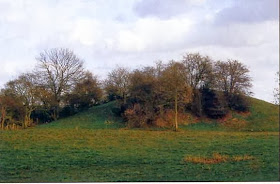Many old customs still survive to this day and are proudly enacted by their local community.
Most of these customs derive from Pagan rituals.
One of the village wells at Lastingham near Pickering in North Yorkshire is dedicated to St Cedd who founded a
monastery there in the 7th century.
In former times it was a local custom for the local girls to dip their
garters in the well on St Agnes’ Eve (20th January) in order to
secure their betrothal.
St Cedd's Well
Another old custom still occurs in the area at
weddings. During the marriage service,
local children secure the churchyard gates with string and before the wedded
couple can be released the Groom must throw handfuls of coins into the group of
waiting children.
Kilburn Church
A custom which has survived at Wimborne Minster in Dorset is that where the Verger walks round the Minster
during the reading of the lessons at Matins and Evensong with a long wand – in
order to keep the congregation awake!
In the little Shropshire
village of Aston-on-Clun, a curious custom is enacted on 29th May
each year when what is called an arbor
tree is decorated with flags of all nations. The tree is now a sapling which was planted
in a special corner of the village to replace the original tree first decorated in 1786 to celebrate the
marriage of local landowner John Marston and Mary Carter.
Travelling along the A832 near Munlochy on the Black Isle
on Scotland’s
north eastern coast, you may be surprised to see that someone has hung their
extensive washing on the trees and bushes at the side of the road. It is in fact the site of a ‘Clootie Well’
dedicated to St Curidan and legend has it that its waters have
healing or magical properties. Those who drink and wash at the well hang pieces of bright cloth, which they have used to wash themselves, on the
nearby branches as an offering to the spirit of the well.
The Clootie Well
 |
In the little village
of Sewerby
near Thirsk in North Yorkshire there is an old
Saxon burial mound known locally as Pudding
Pie Hill. According to local belief
this hill was the haunt of Fairies and until Edwardian times a local custom
involved children running nine times round the hill and then sticking a knife
into the top of the hill, as a result of which it was thought that they would
hear the fairies chattering and playing inside. Another old custom which still continues is
that of rolling hard boiled eggs down the hill on Easter Monday.
Pudding Pie Hill
The Penny Hedge
A curious
custom is maintained every year on the eve of Ascension Day (38 days after
Easter) on the harbour side along Church Street when the Penny Hedge ceremony is re-enacted. The story unfolds in the year
1159 when the Lord of Ugglebarnby (William
de Bruce) and Lord of Sneaton (Ralph de
Percy) together with another nobleman were enjoying a day’s boar hunting in the
forest around Eskdaleside owned by Whitby Abbey. Pursuing a wounded boar into a
cave they found their way barred by a monk who lived there, and in the
excitement and confusion one of the huntsmen struck the hermit a fatal blow. On
his deathbed the monk suggested that his attackers be spared on condition that
they and their heirs perform a penance by erecting a hedge in Whitby Harbour henceforth
every year. Using a penny knife they were to cut a specified number of hazel
boughs in the wood, ten yedders, ten stakes and ten stout stowers, which they
would then bear on their backs to the harbour. There on the shore at the ebb
tide they would erect the said hedge, strong enough to withstand three tides.
Should this ceremony not be performed as demanded then all their lands and
property would be forfeited to the Abbey. This strange ceremony is still
meticulously re-enacted when at the appointed hour of 9am, three men weave the
yedders. stakes and stowers into a short fence – the Penny Hedge. On completion
of their task the senior man gives several blasts on a sheep horn and calls out
the expiatory words three time, “Out on ye,” to complete the ceremony.

The Penny Hedge
The Cheese Rollers
At Cooper's Hill
south east of Gloucester a strange contest takes place each year at May Bank Holiday and has done so
for at least 200 years. Quite simply, a 7lb double Gloucester cheese is rolled
down this very steep grassy hill to be chased by the competitors. It is said
that the slope has a gradient that is in places 1 in 2 and in others 1 in 1,
its surface being very rough and uneven and it is almost impossible to remain
on foot during the decent. Although the
aim is to catch the cheese which reaches a speed of up to 70 mph, this is not
likely to be achieved and the winner is the one who reaches the finishing line
first, with the cheese being the prize. The event has been summarised as “
twenty young men chase a cheese off a cliff and tumble 200 yards to the bottom
where they are scraped up by paramedics and packed off to hospital.” Sprained ankles, broken bones and concussion
are the usual injuries but the event remains ever popular attracting
competitors from all over the world.

Cooper's Hill
|








No comments:
Post a Comment